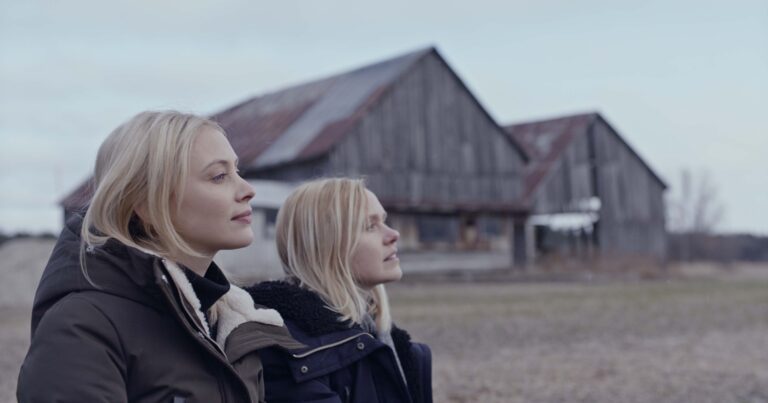Michael McGowan’s adaptation of Miriam Toews’ acclaimed novel All My Puny Sorrows seeks to explore mental illness and injuries both physical and emotional through its depiction of the relationship between two sisters. Yoli (Alison Pill) is a struggling writer in the midst of a messy divorce, an already unpleasant scenario that she exacerbates with her refusal to sign the papers — even her teenage daughter (Amybeth McNulty) thinks she’s being a bit of an asshole about the whole thing, especially since it was her idea in the first place.
Meanwhile, big sister Elfrida (Sarah Gadon) — known to her family as “Elf” — is a world-renown concert pianist with a loving husband and, as Yoli puts is, enough money to disappear and be regarded as a mysterious, eccentric genius for the rest of her life. But if Elf has any say about it, the rest of her life will arrive in fairly short shrift: she’s just been hospitalized after slashing her wrists in a suicide attempt.
Yoli returns home to comfort their mother, Lottie (Mare Winnigham), and plead with her sister to keep living. But Elf insists she’s not crying for help, and that she didn’t make a mistake; she’s steadfast in her determination to die, even begging Yoli to abscond with her to Switzerland. “They have clinics there where suicide is legal, where you don’t have to die alone,” she explains, but Yoli won’t consider it. “I don’t want you to die at all.”
Death is something with which the family is well acquainted. Their father (Donal Logue) took his own life by stepping in front of a train when the girls were young, an event shown in the film’s opening moments, and his wasn’t an isolated incident: sharp-tongued aunt Tina (Mimi Kuzyk) counts more than a dozen brothers and sisters she and Lottie were forced to bury over the years, and a flashback shows Lottie explaining to teenage Elf that she agreed to take a handful of bullets from a neighbor, so she wouldn’t be tempted to use them on herself.
All My Puny Sorrows does an admirable job of examining the way shared trauma affects different individuals, and how each finds their own method of coping. Lottie remains stoic (“as usual,” notes Yoli), rarely showing much in the way of outward emotion, while Yoli’s weapon of choice is a healthy dose of gallows humor, at one point grousing to her older sister about her “placement” on Elf’s suicide note. But unlike the other women in her family, Yoli frequently gives herself over to the confusion and rage that often goes hand-in-hand with grief, and a pair of scenes where the anger comes bubbling to the surface — one in her sister’s hospital room, the other in a parking garage — boast exquisite work from Pill.
That Pill’s performance is so strong helps offset the other characters — especially Elf — being underwritten. Granted, the narrative unfolds from Yoli’s perspective, so it makes a certain amount of sense that her character would enjoy more development than those around here, but All My Puny Sorrows errs in its inability (or perhaps refusal) to provide a better understanding of Elfrida as a person. Surely there must be more to her as a human being than just her depression and suicidal inclinations, but the film seems to have little interest in fleshing her out beyond those qualities. Gadon’s work here is commendable, highlighted in several emotionally charged moments with Pill that mix tenderness with the uglier side of heartache, but such delicate subject matter feels deserving of a more fully realized approach.
The 46th Toronto International Film Festival runs September 9–18, 2021. Find more of our TIFF 2021 coverage at this link.

